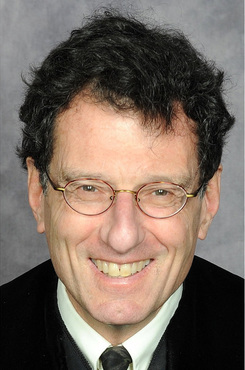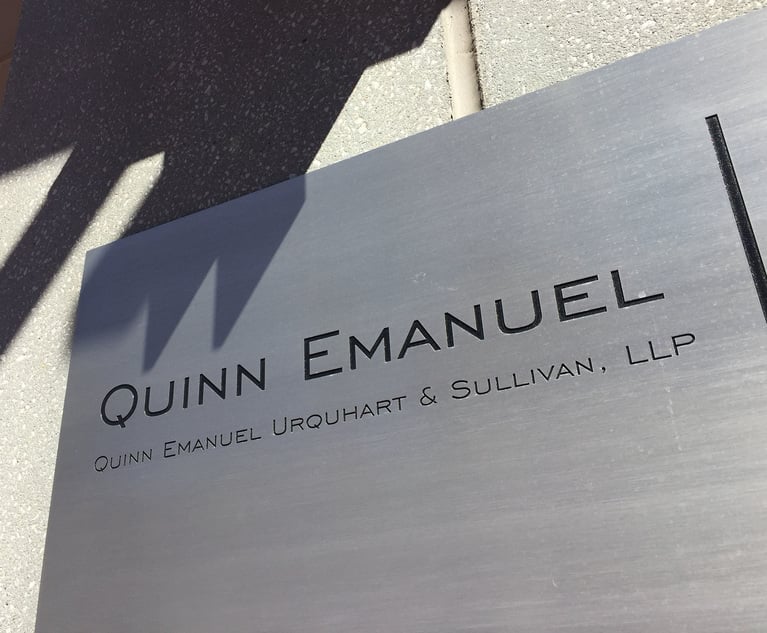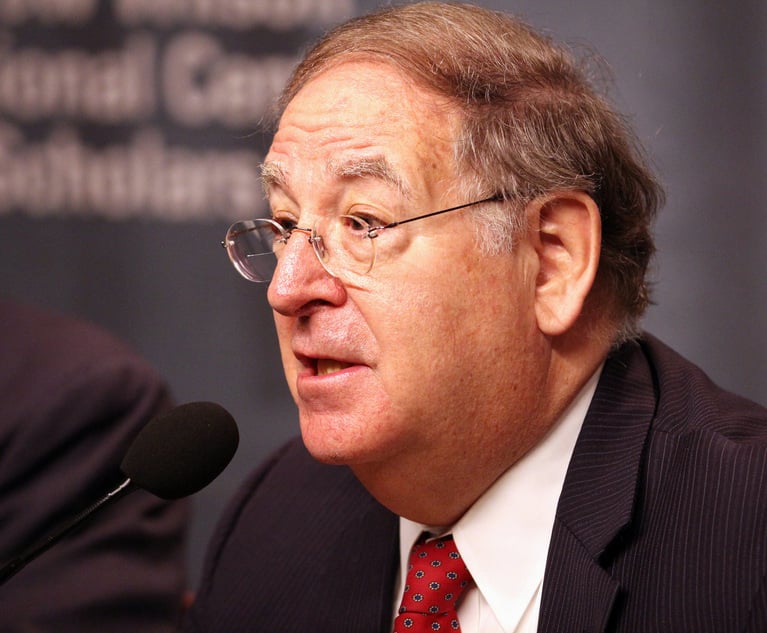Polster Sets Aggressive Discovery Schedule, Slating Opioid Trial for March 2019
With lawyers at an impasse over settling the national opioid litigation, a federal judge in Cleveland has set an aggressive discovery schedule that includes going to trial on March 18 of next year.
April 12, 2018 at 06:10 PM
6 minute read
 U.S. District Judge Dan Polster of the Northern District of Ohio.
U.S. District Judge Dan Polster of the Northern District of Ohio.With lawyers at an impasse over settling the national opioid litigation, a federal judge in Cleveland has set an aggressive discovery schedule that includes going to trial on March 18 of next year.
In his first case management order, U.S. District Judge Dan Polster of the Northern District of Ohio on Wednesday identified which opioid cases would move forward with discovery under a “litigation track,” with the goal of getting the parties closer to settlement.
Polster, who is overseeing more than 430 lawsuits brought primarily by cities and counties against opioid manufacturers and distributors, set the trial in three cases brought in Ohio, including a lawsuit by the city of Cleveland. He also ordered briefing on motions to dismiss based on “threshold legal issues” in six other cases in the states of Alabama, Ohio, Illinois, Michigan, West Virginia and Florida, including those brought by Florida's Broward County, the city of Chicago and the Alabama attorney general. Native American tribes and hospitals also would have cases included.
Paul Hanly of Simmons Hanly Conroy, co-lead plaintiffs counsel in the opioid litigation, said the order drew largely upon a discovery plan put forth by the plaintiffs attorneys—including which cases to litigate.
“The ligation is national in scope,” he said. “And sooner or later, the various laws of different states are going to apply, so we picked those states because there may be some particular issues of state law he wants addressed and, secondly, those are communities that have extremely been hard hit. Not that there are any communities where this is not a problem, but those are particularly hard hit.”
Polster also expanded his previous order requiring the U.S. Drug Enforcement Agency to turn over to plaintiffs lawyers certain data from a database that tracks opioid sales.
“Discovery of precisely which manufacturers sent which drugs to which distributors, and which distributors sent which drugs to which pharmacies and doctors, is critical not only to all of plaintiffs' claims, but also to the court's understanding of the width and depth of this litigation,” he wrote in a Wednesday order.
The orders follow Polster's decision last month to allow some discovery in the opioid litigation. The judge previously was focused entirely on settling the cases.
The discovery orders, however, don't indicate that Polster has switched gears on settlement talks. He has scheduled a settlement conference for May 10 and, on Monday, added five more lawyers to the settlement table who represent retail chain pharmacies such as Walmart and Walgreens.
On Tuesday, he also also ordered the defendants to pay up for their 50 percent share of costs associated with paying for three special masters. Hanly said the total monthly bill for the special masters is hundreds of thousands of dollars.
“We the plaintiffs have timely paid our 50 percent, in fact we pay our 50 percent on the very day that we receive the invoices, and apparently the defendants have not,” he said. “We thought that was somewhat amusing.”
Lawyers and spokespeople for the defendants, which include Purdue Pharma, which is headquartered in Cranbury Township, New Jersey, and McKesson, which is based in San Francisco, either did not respond to requests for a comment, or declined to comment.
Rulings on motions to dismiss could influence lawyers and judges in lawsuits in state courts, where most attorneys general have sued opioid defendants. In fact, Polster said attorneys general in other states could file amicus briefs in the Alabama attorney general's case and appointed one of the settlement masters, Cathy Yanni, to oversee coordination with state court cases.
“Certainly, other states would be paying attention whether they deem it precedential or not,” said Rhon Jones, head of the toxic torts practice at Beasley, Allen, Crow, Methvin, Portis & Miles, who represents Alabama Attorney General Steve Marshall in his opioid case.
He said the expanded order on the drug database, called the Automated Records and Consolidated Orders System, or ARCOS, is “100 percent helpful.”
“It'll have information about the pills, who distributed them, who they went to, how many,” he said. “In my mind, this is fantastic news because it really goes hand in hand with his order on case management because you're attempting to clarify what has been done and what hasn't been done and by whom.”
Department of Justice lawyers initially balked at providing the database, even as U.S. Attorney General Jeff Sessions insisted the federal government would pursue legal action against opioid makers. Polster ordered the DEA to turn over the database, but limited the data to what could be on Excel spreadsheets—generally, identifying the manufacturers and distributors that sold 95 percent of all opioids.
In Wednesday's order, Polster said the plaintiffs still did not know which manufacturers sold what types of pills to which distributors.
“In any given case, therefore, the plaintiff still cannot know for sure who are the correct defendants, or the scope of their potential liability,” he wrote.
He ordered the DEA to provide by April 20 more data for the six states at issue.
Meanwhile, the U.S. government has asked to be involved in settlement talks.
“After evaluating applicable federal statutes, the federal government's numerous other opioids efforts and its statutory authority to recover funds when the United States has paid for or provided medical treatments, the United States has determined that it can best assist the court in this litigation as a 'friend of the court,'” wrote Assistant U.S. Attorney James Bennett, of the U.S. Attorney's Office in Cleveland, in an April 2 motion. “The United States' substantial financial stake in combating the opioid epidemic has implications for the proper allocation of any monetary settlement of the claims asserted in the multidistrict litigation.”
This content has been archived. It is available through our partners, LexisNexis® and Bloomberg Law.
To view this content, please continue to their sites.
Not a Lexis Subscriber?
Subscribe Now
Not a Bloomberg Law Subscriber?
Subscribe Now
NOT FOR REPRINT
© 2025 ALM Global, LLC, All Rights Reserved. Request academic re-use from www.copyright.com. All other uses, submit a request to [email protected]. For more information visit Asset & Logo Licensing.
You Might Like
View All
Quinn Emanuel Files Countersuit Against DOJ in Row Over Premerger Reporting
3 minute read
'Thoughtful Jurist': Maryland US District Senior Judge Messitte Dies After Short Illness
4 minute read
'Religious Discrimination'?: 4th Circuit Revives Challenge to Employer Vaccine Mandate
2 minute read
4th Circuit Revives Racial Harassment Lawsuit Against North Carolina School District
3 minute readTrending Stories
- 1Reviewing Judge Merchan's Unconditional Discharge
- 2With New Civil Jury Selection Rule, Litigants Should Carefully Weigh Waiver Risks
- 3Young Lawyers Become Old(er) Lawyers
- 4Caught In the In Between: A Legal Roadmap for the Sandwich Generation
- 5Top 10 Developments, Lessons, and Reminders of 2024
Who Got The Work
J. Brugh Lower of Gibbons has entered an appearance for industrial equipment supplier Devco Corporation in a pending trademark infringement lawsuit. The suit, accusing the defendant of selling knock-off Graco products, was filed Dec. 18 in New Jersey District Court by Rivkin Radler on behalf of Graco Inc. and Graco Minnesota. The case, assigned to U.S. District Judge Zahid N. Quraishi, is 3:24-cv-11294, Graco Inc. et al v. Devco Corporation.
Who Got The Work
Rebecca Maller-Stein and Kent A. Yalowitz of Arnold & Porter Kaye Scholer have entered their appearances for Hanaco Venture Capital and its executives, Lior Prosor and David Frankel, in a pending securities lawsuit. The action, filed on Dec. 24 in New York Southern District Court by Zell, Aron & Co. on behalf of Goldeneye Advisors, accuses the defendants of negligently and fraudulently managing the plaintiff's $1 million investment. The case, assigned to U.S. District Judge Vernon S. Broderick, is 1:24-cv-09918, Goldeneye Advisors, LLC v. Hanaco Venture Capital, Ltd. et al.
Who Got The Work
Attorneys from A&O Shearman has stepped in as defense counsel for Toronto-Dominion Bank and other defendants in a pending securities class action. The suit, filed Dec. 11 in New York Southern District Court by Bleichmar Fonti & Auld, accuses the defendants of concealing the bank's 'pervasive' deficiencies in regards to its compliance with the Bank Secrecy Act and the quality of its anti-money laundering controls. The case, assigned to U.S. District Judge Arun Subramanian, is 1:24-cv-09445, Gonzalez v. The Toronto-Dominion Bank et al.
Who Got The Work
Crown Castle International, a Pennsylvania company providing shared communications infrastructure, has turned to Luke D. Wolf of Gordon Rees Scully Mansukhani to fend off a pending breach-of-contract lawsuit. The court action, filed Nov. 25 in Michigan Eastern District Court by Hooper Hathaway PC on behalf of The Town Residences LLC, accuses Crown Castle of failing to transfer approximately $30,000 in utility payments from T-Mobile in breach of a roof-top lease and assignment agreement. The case, assigned to U.S. District Judge Susan K. Declercq, is 2:24-cv-13131, The Town Residences LLC v. T-Mobile US, Inc. et al.
Who Got The Work
Wilfred P. Coronato and Daniel M. Schwartz of McCarter & English have stepped in as defense counsel to Electrolux Home Products Inc. in a pending product liability lawsuit. The court action, filed Nov. 26 in New York Eastern District Court by Poulos Lopiccolo PC and Nagel Rice LLP on behalf of David Stern, alleges that the defendant's refrigerators’ drawers and shelving repeatedly break and fall apart within months after purchase. The case, assigned to U.S. District Judge Joan M. Azrack, is 2:24-cv-08204, Stern v. Electrolux Home Products, Inc.
Featured Firms
Law Offices of Gary Martin Hays & Associates, P.C.
(470) 294-1674
Law Offices of Mark E. Salomone
(857) 444-6468
Smith & Hassler
(713) 739-1250










